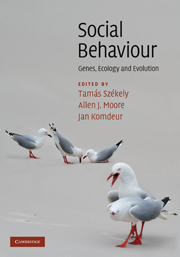Book contents
- Frontmatter
- Contents
- List of contributors
- Introduction: The uphill climb of sociobiology: towards a new synthesis
- Profile: Undiminished passion
- Part I Foundations
- Part II Themes
- 7 Aggression: towards an integration of gene, brain and behaviour
- Profile: From behavioural observations, to genes, to evolution
- 8 Social influences on communication signals: from honesty to exploitation
- Profile: Reputation can make the world go round – or why we are sometimes social
- 9 Important topics in group living
- Profile: A haphazard career
- 10 Sexual behaviour: conflict, cooperation and coevolution
- Profile: In celebration of questions, past, present and future
- 11 Pair bonds and parental behaviour
- Profile: Mating systems and genetic variation
- 12 Adaptations and constraints in the evolution of delayed dispersal: implications for cooperation
- Profile: Selections from a life in social selection
- 13 Social behaviour in microorganisms
- Profile: The de novo evolution of cooperation: an unlikely event
- 14 Social environments, social tactics and their fitness consequences in complex mammalian societies
- Profile: Evolutionary genetics and social behaviour: changed perspectives on sexual coevolution
- 15 Social behaviour in humans
- Profile: Genes and social behaviour: from gene to genome to 1000 genomes
- Part III Implications
- Species index
- Subject index
- References
Profile: In celebration of questions, past, present and future
Published online by Cambridge University Press: 05 June 2012
- Frontmatter
- Contents
- List of contributors
- Introduction: The uphill climb of sociobiology: towards a new synthesis
- Profile: Undiminished passion
- Part I Foundations
- Part II Themes
- 7 Aggression: towards an integration of gene, brain and behaviour
- Profile: From behavioural observations, to genes, to evolution
- 8 Social influences on communication signals: from honesty to exploitation
- Profile: Reputation can make the world go round – or why we are sometimes social
- 9 Important topics in group living
- Profile: A haphazard career
- 10 Sexual behaviour: conflict, cooperation and coevolution
- Profile: In celebration of questions, past, present and future
- 11 Pair bonds and parental behaviour
- Profile: Mating systems and genetic variation
- 12 Adaptations and constraints in the evolution of delayed dispersal: implications for cooperation
- Profile: Selections from a life in social selection
- 13 Social behaviour in microorganisms
- Profile: The de novo evolution of cooperation: an unlikely event
- 14 Social environments, social tactics and their fitness consequences in complex mammalian societies
- Profile: Evolutionary genetics and social behaviour: changed perspectives on sexual coevolution
- 15 Social behaviour in humans
- Profile: Genes and social behaviour: from gene to genome to 1000 genomes
- Part III Implications
- Species index
- Subject index
- References
Summary
But I now see that the whole problem is so intricate that it is safer to leave its solution for the future.
Darwin (1874) on the evolution of the unity sex ratio; later solved by Fisher (1930)A vital part of science is the compulsion to ask questions, even if, like Darwin, we cannot always find an answer. I admit to being surprised, almost offended, when people claim not to be interested in animals, what animals do, and why they do it. I don't care at all if someone isn't interested in my other preoccupations – jazz, exhibition poultry – why should they be? But somehow I can't accept that it is possible not to have an interest in the evolution of behaviour – the evolution of our own behaviour, and ultimately why we are what we are. Indeed, it seems impossible to gain insight about ourselves without considering the diversity of animal life, and our place in it all.
Maybe that, and my fascination for natural history, was why I changed almost immediately from medicine to zoology as a student at Bristol University in 1962. Medicine would have offered affluence and security, but when ‘push came to shove’, I opted for the risk and adventure of following my obsession. Biology – indeed science itself – offers a philosophy and insight into the nature of life that applied science and technology does not.
- Type
- Chapter
- Information
- Social BehaviourGenes, Ecology and Evolution, pp. 267 - 270Publisher: Cambridge University PressPrint publication year: 2010
References
- 2
- Cited by

